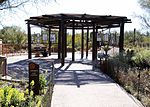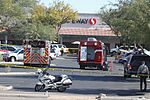On January 8, 2011, U.S. Representative Gabby Giffords and 18 others were shot during a constituent meeting held in a supermarket parking lot in Casas Adobes, Arizona, in the Tucson metropolitan area. Six people were killed, including federal District Court Chief Judge John Roll; Gabe Zimmerman, one of Giffords's staffers; and a 9-year-old girl, Christina-Taylor Green. Giffords was holding the meeting, called "Congress on Your Corner", in the parking lot of a Safeway store when Jared Lee Loughner drew a pistol and shot her in the head before proceeding to fire on other people. One additional person was injured in the immediate aftermath of the shooting. News reports identified the target of the attack to be Giffords, a Democrat representing Arizona's 8th congressional district. She was shot through the head at point-blank range, and her medical condition was initially described as "critical".Loughner, a 22-year-old Tucson man who was fixated on Giffords, was arrested at the scene. Federal prosecutors filed five charges against him, including the attempted assassination of a member of Congress and the assassination of a federal judge. Loughner previously had been arrested once (but not convicted) on a minor drug charge and had been suspended by his college for disruptive behavior. Court filings include notes handwritten by Loughner indicating he planned to assassinate Giffords. Loughner did not cooperate with authorities, invoking his right to remain silent. He was held without bail and indicted on 49 counts. In January 2012, Loughner was found by a federal judge to be incompetent to stand trial based on two medical evaluations, which diagnosed him with paranoid schizophrenia. On August 7, Loughner had a hearing in which he was judged competent. He pleaded guilty to 19 counts, and in November 2012 was sentenced to life in prison.
Following the shooting, American and international politicians expressed grief and condemnations. Gun control advocates pushed for increased restrictions on the sale of firearms and ammunition, specifically high-capacity magazines. Some commentators criticized the use of harsh political rhetoric in the United States, with a number blaming the political right wing for the shooting. In particular, Sarah Palin was criticized for a poster by her political action committee that featured stylized crosshairs on an electoral map which included Giffords. Palin rejected claims that she bore any responsibility for the shooting. President Barack Obama led a nationally televised memorial service on January 12, and other memorials took place.





